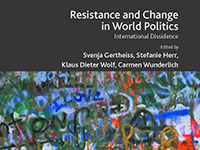When is opposition radicalizing against international institutions and embodied norms? What are the conditions under which dissident actors succeed in introducing and establishing alternative conceptions of order?
The research project ”‘Rogue States’, ‘Outlaws’, and ‘Pariahs’: Dissidence between Delegitimization and Justification” focused on these questions and analyzed how radical dissidence is dealt with and under which conditions governmental or non-governmental representatives of dissident conceptions either succeed in gaining recognition or come to be discredited as “rogues”, “outlaws” or “pariahs”.
The project’s outcomes are presented in the volume “Resistance and Change in World Politics. International Dissidence”, edited by Svenja Gertheiss, Stefanie Herr, Klaus Dieter Wolf and Carmen Wunderlich and published by Palgrave Macmillan in 2017. The volume provides a conceptual framework for analyzing dissidence along with its different developments and effects. The authors use case studies to trace different processes of dissidence in various policy areas such as health, migration, religion and international security. Thus, the authors analyze, e.g., how some states were able to discard their labelling as “rogue states” at least temporary or how developing countries, formerly branded as dissident, succeed in the debate over generic drugs. They show that especially coalition building and strategic framing turn out to be decisive for the success of recognition and implementation of alternative conceptions of order.
The project was funded by the German Research Foundation (DFG) and completed in 2016.
